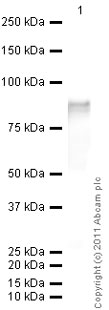Recombinant Klebsiella pneumoniae Kanamycin kinase type II/NEO
| Product name: | Recombinant Klebsiella pneumoniae Kanamycin kinase type II/NEO |
| Source: | E.coli |
| Purity: | Greater than 95% as determined by reducing SDS-PAGE. |
| Buffer Formulation: | Supplied as a 0.2 μm filtered solution of PBS, pH 7.4, 20% Glycerol. |
| Applications: | Applications:SDS-PAGE; WB; ELISA; IP. |
| Storage: | Avoid repeated freeze/thaw cycles. Store at 2-8 oC for one month. Aliquot and store at -80 oC for 12 months. |
| UOM: | 100ug/50ug/200ug/1mg/1g |
| Source | E.coli |
| Description | Recombinant Klebsiella pneumoniae Aminoglycoside 3'-phosphotransferase is produced by our E.coli expression system and the target gene encoding Met1-Phe264 is expressed. |
| Names | Aminoglycoside 3'-phosphotransferase; APH(3')-II; APH(3')II; Kanamycin kinase type II; Neomycin-kanamycin phosphotransferase type II; neo |
| Accession # | P00552 |
| Formulation | Supplied as a 0.2 μm filtered solution of PBS, pH 7.4, 20% Glycerol. |
| Shipping |
The product is shipped on dry ice/ice packs. |
| Storage |
Store at < -20°C, stable for 6 months after receipt. Please minimize freeze-thaw cycles. |
| Biological Activity |
IN STOCK |
| Purity |
Greater than 95% as determined by reducing SDS-PAGE. |
| Endotoxin | Less than 0.1 ng/µg (1 IEU/µg) as determined by LAL test. |
| Amino Acid Sequence |
MIEQDGLHAGSPAAWVERLFGYDWAQQTIGCSDAAVFRLSAQGRPVLFVKTDLSGALNELQDEAA RLSWLATTGVPCAAVLDVVTEAGRDWLLLGEVPGQDLLSSHLAPAEKVSIMADAMRRLHTLDPAT CPFDHQAKHRIERARTRMEAGLVDQDDLDEEHQGLAPAELFARLKARMPDGEDLVVTHGDACLPN IMVENGRFSGFIDCGRLGVADRYQDIALATRDIAEELGGEWADRFLVLYGIAAPDSQRIAFYRLL DEFF
|
| Background | Aminoglycoside 3'-phosphotransferase (APH(3')), also known as aminoglycoside kinase, is an aminoglycoside-modifying enzyme and widely presented in resistant bacteria. These ATP-dependent enzymes phosphorylate the 3'-hydroxyl of a variety of aminoglycosides including kanamycins, neomycins, paromomycins, neamine, ribostamycin, geneticin, and paromamine. These phosphorylated aminoglycosides fail to bind to their respective ribosomal binding sites with high affinity; hence resistance is conferred to the drugs that are phosphorylated. APH(3') is primarily found in certain species of gram-positive bacteria. |














